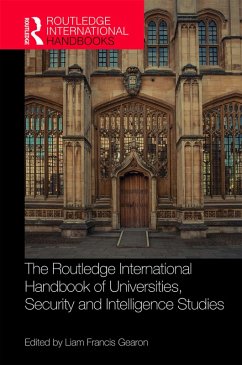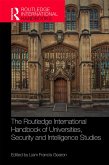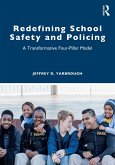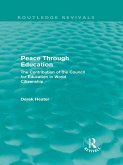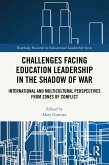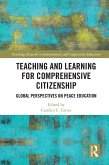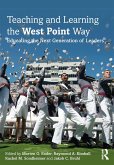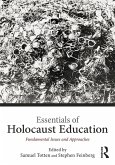The Routledge International Handbook of Universities, Security and Intelligence Studies (eBook, ePUB)
Redaktion: Gearon, Liam
45,95 €
45,95 €
inkl. MwSt.
Sofort per Download lieferbar

23 °P sammeln
45,95 €
Als Download kaufen

45,95 €
inkl. MwSt.
Sofort per Download lieferbar

23 °P sammeln
Jetzt verschenken
Alle Infos zum eBook verschenken
45,95 €
inkl. MwSt.
Sofort per Download lieferbar
Alle Infos zum eBook verschenken

23 °P sammeln
The Routledge International Handbook of Universities, Security and Intelligence Studies (eBook, ePUB)
Redaktion: Gearon, Liam
- Format: ePub
- Merkliste
- Auf die Merkliste
- Bewerten Bewerten
- Teilen
- Produkt teilen
- Produkterinnerung
- Produkterinnerung

Bitte loggen Sie sich zunächst in Ihr Kundenkonto ein oder registrieren Sie sich bei
bücher.de, um das eBook-Abo tolino select nutzen zu können.
Hier können Sie sich einloggen
Hier können Sie sich einloggen
Sie sind bereits eingeloggt. Klicken Sie auf 2. tolino select Abo, um fortzufahren.

Bitte loggen Sie sich zunächst in Ihr Kundenkonto ein oder registrieren Sie sich bei bücher.de, um das eBook-Abo tolino select nutzen zu können.
Selected case studies from each of the world's continents provide a truly global, comparative context and accessible, in-depth analysis of the historical and contemporary relationships between global universities, national security and intelligence agencies.
- Geräte: eReader
- ohne Kopierschutz
- eBook Hilfe
- Größe: 14.1MB
Andere Kunden interessierten sich auch für
![The Routledge International Handbook of Universities, Security and Intelligence Studies (eBook, PDF) The Routledge International Handbook of Universities, Security and Intelligence Studies (eBook, PDF)]() The Routledge International Handbook of Universities, Security and Intelligence Studies (eBook, PDF)45,95 €
The Routledge International Handbook of Universities, Security and Intelligence Studies (eBook, PDF)45,95 €![Redefining School Safety and Policing (eBook, ePUB) Redefining School Safety and Policing (eBook, ePUB)]() Jeffrey D. YarbroughRedefining School Safety and Policing (eBook, ePUB)37,95 €
Jeffrey D. YarbroughRedefining School Safety and Policing (eBook, ePUB)37,95 €![Peace Through Education (Routledge Revivals) (eBook, ePUB) Peace Through Education (Routledge Revivals) (eBook, ePUB)]() Derek HeaterPeace Through Education (Routledge Revivals) (eBook, ePUB)55,95 €
Derek HeaterPeace Through Education (Routledge Revivals) (eBook, ePUB)55,95 €![Challenges facing Education Leadership in the Shadow of War (eBook, ePUB) Challenges facing Education Leadership in the Shadow of War (eBook, ePUB)]() Challenges facing Education Leadership in the Shadow of War (eBook, ePUB)42,95 €
Challenges facing Education Leadership in the Shadow of War (eBook, ePUB)42,95 €![Teaching and Learning for Comprehensive Citizenship (eBook, ePUB) Teaching and Learning for Comprehensive Citizenship (eBook, ePUB)]() Teaching and Learning for Comprehensive Citizenship (eBook, ePUB)41,95 €
Teaching and Learning for Comprehensive Citizenship (eBook, ePUB)41,95 €![Teaching and Learning the West Point Way (eBook, ePUB) Teaching and Learning the West Point Way (eBook, ePUB)]() Teaching and Learning the West Point Way (eBook, ePUB)37,95 €
Teaching and Learning the West Point Way (eBook, ePUB)37,95 €![Essentials of Holocaust Education (eBook, ePUB) Essentials of Holocaust Education (eBook, ePUB)]() Essentials of Holocaust Education (eBook, ePUB)45,95 €
Essentials of Holocaust Education (eBook, ePUB)45,95 €-
-
-
Selected case studies from each of the world's continents provide a truly global, comparative context and accessible, in-depth analysis of the historical and contemporary relationships between global universities, national security and intelligence agencies.
Dieser Download kann aus rechtlichen Gründen nur mit Rechnungsadresse in A, B, BG, CY, CZ, D, DK, EW, E, FIN, F, GR, HR, H, IRL, I, LT, L, LR, M, NL, PL, P, R, S, SLO, SK ausgeliefert werden.
Produktdetails
- Produktdetails
- Verlag: Taylor & Francis eBooks
- Seitenzahl: 568
- Erscheinungstermin: 8. Oktober 2019
- Englisch
- ISBN-13: 9781351332408
- Artikelnr.: 57871855
- Verlag: Taylor & Francis eBooks
- Seitenzahl: 568
- Erscheinungstermin: 8. Oktober 2019
- Englisch
- ISBN-13: 9781351332408
- Artikelnr.: 57871855
- Herstellerkennzeichnung Die Herstellerinformationen sind derzeit nicht verfügbar.
Liam Francis Gearon is Senior Research Fellow at Harris Manchester College, and Associate Professor at the Department of Education, University of Oxford, UK. He is also Conjoint Professor at the University of Newcastle, Australia.
Introduction; Part I Universities, Security and Intelligence Studies: An
Academic Cartography; Chapter 1 The University-Security-Intelligence Nexus:
Four Domains; Part II Universities, Security, Intelligence: National
Contexts, International Settings; Chapter 2 American Universities, the CIA,
and the Teaching of National Security Intelligence; Chapter 3 The FBI,
Cyber-Security and American Campuses: Academia, Government, and Industry as
Allies in Cybersecurity Effectiveness; Chapter 4 'What was needed were
copyists, filers, and really intelligent men of capacity': British Signals
Intelligence and the Universities, 1914-1992 Chapter 5 Datafication and
Universities: The Convergence of Spies, Scholars and Science; Chapter 6 The
Relationship between Intelligence and the Academy in Canada; Chapter 7 'I
would remind you that NATO is not a university': Navigating the Challenges
and Legacy of NATO Economic Intelligence; Chapter 8 Understanding the
Relationships between Academia and National Security Intelligence in the
European Context; Chapter 9 The German Foreign Intelligence Agency (BND):
Publicly Addressing a Clandestine History; Chapter 10 The Figure of the
Traitor in the Chekist Cosmology; Chapter 11 How Russia Trains Its Spies:
The Past and Present of Russian Intelligence Education; Chapter 12 The
Chinese Intelligence Service; Part III Espionage and the Academy: Spy
Stories; Chapter 13 The Cambridge Spy Ring: The Mystery of Wilfrid Mann;
Chapter 14 John Gordon Coates PhD DSO (1918-2006) Conscientious Objector,
Interrogator, Intelligence Officer, Commando, Saboteur, Spy...Academic;
Part IV Spies, Scholars and the Study of Intelligence; Chapter 15 The
Oxford Intelligence Group; Chapter 16 A Missing Dimension No Longer:
Intelligence Studies, Professor Christopher Andrew, and the University of
Cambridge; Part V University Security and Intelligence Studies: Research
and Scholarship, Teaching and Ethics; Chapter 17 What Do We Teach When We
Teach Intelligence Ethics?; Chapter 18 Secret and Ethically Sensitive
Research; Chapter 19 Intelligent Studies: Degrees in Intelligence and the
Intelligence Community; Chapter 20 Experimenting with Intelligence
Education: Overcoming Design Challenges in Multidisciplinary Intelligence
Analysis Programs; Part VI Security, Intelligence, and Securitization
Theory: Comparative and International Terrorism Research; Chapter 21 The
Epistemologies of Terrorism and Counter-Terrorism Research; Chapter 22
Dynamics of Securitization: An Analysis of Universities' Engagement with
the Prevent Legislation; Chapter 23 Comparative Perspectives on
Intelligence and the Management of Radicalisation and Extremism in
Universities in Asia and Africa; Part VII Universities, Security and Secret
Intelligence Diplomatic, Journalistic and Policy Perspectives; Chapter 24
Between Lucky Jim and George Smiley: The Public Policy Role of Intelligence
Scholars; Chapter 25 But What Do You Want It For? Secret Intelligence and
the Foreign Policy Practitioner; Chapter 26 Intelligence Recruitment in
1945 and 'Peculiar Personal Characteristics'; Chapter 27 'Men of the
Professor Type' Revisited: Building a Partnership between Academic Research
and National Security; Chapter 28 Open Source Intelligence: Academic
Research, Journalism or Spying?; Chapter 29 Overkill: Why universities
modelling the impact of nuclear war in the 1980s could not change the views
of the security state; Part VIII Universities, Security and Intelligence:
Disciplinary Lenses of the Arts, Literature and Humanities; Chapter 30; The
Art(s and Humanities) of Security: A Broader Approach to Countering
Security Threats; Chapter 31 Dispelling the Myths: Academic Studies,
Intelligence and Historical Research; Chapter 32; Stalin's Library; Chapter
33 A Landscape of Lies in the Land of Letters: The Literary Cartography of
Security and Intelligence; Supplementary; National Security and
Intelligence - Outreach, Commentary, Critique: A Global Survey of Official,
Policy and Academic Sources
Academic Cartography; Chapter 1 The University-Security-Intelligence Nexus:
Four Domains; Part II Universities, Security, Intelligence: National
Contexts, International Settings; Chapter 2 American Universities, the CIA,
and the Teaching of National Security Intelligence; Chapter 3 The FBI,
Cyber-Security and American Campuses: Academia, Government, and Industry as
Allies in Cybersecurity Effectiveness; Chapter 4 'What was needed were
copyists, filers, and really intelligent men of capacity': British Signals
Intelligence and the Universities, 1914-1992 Chapter 5 Datafication and
Universities: The Convergence of Spies, Scholars and Science; Chapter 6 The
Relationship between Intelligence and the Academy in Canada; Chapter 7 'I
would remind you that NATO is not a university': Navigating the Challenges
and Legacy of NATO Economic Intelligence; Chapter 8 Understanding the
Relationships between Academia and National Security Intelligence in the
European Context; Chapter 9 The German Foreign Intelligence Agency (BND):
Publicly Addressing a Clandestine History; Chapter 10 The Figure of the
Traitor in the Chekist Cosmology; Chapter 11 How Russia Trains Its Spies:
The Past and Present of Russian Intelligence Education; Chapter 12 The
Chinese Intelligence Service; Part III Espionage and the Academy: Spy
Stories; Chapter 13 The Cambridge Spy Ring: The Mystery of Wilfrid Mann;
Chapter 14 John Gordon Coates PhD DSO (1918-2006) Conscientious Objector,
Interrogator, Intelligence Officer, Commando, Saboteur, Spy...Academic;
Part IV Spies, Scholars and the Study of Intelligence; Chapter 15 The
Oxford Intelligence Group; Chapter 16 A Missing Dimension No Longer:
Intelligence Studies, Professor Christopher Andrew, and the University of
Cambridge; Part V University Security and Intelligence Studies: Research
and Scholarship, Teaching and Ethics; Chapter 17 What Do We Teach When We
Teach Intelligence Ethics?; Chapter 18 Secret and Ethically Sensitive
Research; Chapter 19 Intelligent Studies: Degrees in Intelligence and the
Intelligence Community; Chapter 20 Experimenting with Intelligence
Education: Overcoming Design Challenges in Multidisciplinary Intelligence
Analysis Programs; Part VI Security, Intelligence, and Securitization
Theory: Comparative and International Terrorism Research; Chapter 21 The
Epistemologies of Terrorism and Counter-Terrorism Research; Chapter 22
Dynamics of Securitization: An Analysis of Universities' Engagement with
the Prevent Legislation; Chapter 23 Comparative Perspectives on
Intelligence and the Management of Radicalisation and Extremism in
Universities in Asia and Africa; Part VII Universities, Security and Secret
Intelligence Diplomatic, Journalistic and Policy Perspectives; Chapter 24
Between Lucky Jim and George Smiley: The Public Policy Role of Intelligence
Scholars; Chapter 25 But What Do You Want It For? Secret Intelligence and
the Foreign Policy Practitioner; Chapter 26 Intelligence Recruitment in
1945 and 'Peculiar Personal Characteristics'; Chapter 27 'Men of the
Professor Type' Revisited: Building a Partnership between Academic Research
and National Security; Chapter 28 Open Source Intelligence: Academic
Research, Journalism or Spying?; Chapter 29 Overkill: Why universities
modelling the impact of nuclear war in the 1980s could not change the views
of the security state; Part VIII Universities, Security and Intelligence:
Disciplinary Lenses of the Arts, Literature and Humanities; Chapter 30; The
Art(s and Humanities) of Security: A Broader Approach to Countering
Security Threats; Chapter 31 Dispelling the Myths: Academic Studies,
Intelligence and Historical Research; Chapter 32; Stalin's Library; Chapter
33 A Landscape of Lies in the Land of Letters: The Literary Cartography of
Security and Intelligence; Supplementary; National Security and
Intelligence - Outreach, Commentary, Critique: A Global Survey of Official,
Policy and Academic Sources
Introduction; Part I Universities, Security and Intelligence Studies: An
Academic Cartography; Chapter 1 The University-Security-Intelligence Nexus:
Four Domains; Part II Universities, Security, Intelligence: National
Contexts, International Settings; Chapter 2 American Universities, the CIA,
and the Teaching of National Security Intelligence; Chapter 3 The FBI,
Cyber-Security and American Campuses: Academia, Government, and Industry as
Allies in Cybersecurity Effectiveness; Chapter 4 'What was needed were
copyists, filers, and really intelligent men of capacity': British Signals
Intelligence and the Universities, 1914-1992 Chapter 5 Datafication and
Universities: The Convergence of Spies, Scholars and Science; Chapter 6 The
Relationship between Intelligence and the Academy in Canada; Chapter 7 'I
would remind you that NATO is not a university': Navigating the Challenges
and Legacy of NATO Economic Intelligence; Chapter 8 Understanding the
Relationships between Academia and National Security Intelligence in the
European Context; Chapter 9 The German Foreign Intelligence Agency (BND):
Publicly Addressing a Clandestine History; Chapter 10 The Figure of the
Traitor in the Chekist Cosmology; Chapter 11 How Russia Trains Its Spies:
The Past and Present of Russian Intelligence Education; Chapter 12 The
Chinese Intelligence Service; Part III Espionage and the Academy: Spy
Stories; Chapter 13 The Cambridge Spy Ring: The Mystery of Wilfrid Mann;
Chapter 14 John Gordon Coates PhD DSO (1918-2006) Conscientious Objector,
Interrogator, Intelligence Officer, Commando, Saboteur, Spy...Academic;
Part IV Spies, Scholars and the Study of Intelligence; Chapter 15 The
Oxford Intelligence Group; Chapter 16 A Missing Dimension No Longer:
Intelligence Studies, Professor Christopher Andrew, and the University of
Cambridge; Part V University Security and Intelligence Studies: Research
and Scholarship, Teaching and Ethics; Chapter 17 What Do We Teach When We
Teach Intelligence Ethics?; Chapter 18 Secret and Ethically Sensitive
Research; Chapter 19 Intelligent Studies: Degrees in Intelligence and the
Intelligence Community; Chapter 20 Experimenting with Intelligence
Education: Overcoming Design Challenges in Multidisciplinary Intelligence
Analysis Programs; Part VI Security, Intelligence, and Securitization
Theory: Comparative and International Terrorism Research; Chapter 21 The
Epistemologies of Terrorism and Counter-Terrorism Research; Chapter 22
Dynamics of Securitization: An Analysis of Universities' Engagement with
the Prevent Legislation; Chapter 23 Comparative Perspectives on
Intelligence and the Management of Radicalisation and Extremism in
Universities in Asia and Africa; Part VII Universities, Security and Secret
Intelligence Diplomatic, Journalistic and Policy Perspectives; Chapter 24
Between Lucky Jim and George Smiley: The Public Policy Role of Intelligence
Scholars; Chapter 25 But What Do You Want It For? Secret Intelligence and
the Foreign Policy Practitioner; Chapter 26 Intelligence Recruitment in
1945 and 'Peculiar Personal Characteristics'; Chapter 27 'Men of the
Professor Type' Revisited: Building a Partnership between Academic Research
and National Security; Chapter 28 Open Source Intelligence: Academic
Research, Journalism or Spying?; Chapter 29 Overkill: Why universities
modelling the impact of nuclear war in the 1980s could not change the views
of the security state; Part VIII Universities, Security and Intelligence:
Disciplinary Lenses of the Arts, Literature and Humanities; Chapter 30; The
Art(s and Humanities) of Security: A Broader Approach to Countering
Security Threats; Chapter 31 Dispelling the Myths: Academic Studies,
Intelligence and Historical Research; Chapter 32; Stalin's Library; Chapter
33 A Landscape of Lies in the Land of Letters: The Literary Cartography of
Security and Intelligence; Supplementary; National Security and
Intelligence - Outreach, Commentary, Critique: A Global Survey of Official,
Policy and Academic Sources
Academic Cartography; Chapter 1 The University-Security-Intelligence Nexus:
Four Domains; Part II Universities, Security, Intelligence: National
Contexts, International Settings; Chapter 2 American Universities, the CIA,
and the Teaching of National Security Intelligence; Chapter 3 The FBI,
Cyber-Security and American Campuses: Academia, Government, and Industry as
Allies in Cybersecurity Effectiveness; Chapter 4 'What was needed were
copyists, filers, and really intelligent men of capacity': British Signals
Intelligence and the Universities, 1914-1992 Chapter 5 Datafication and
Universities: The Convergence of Spies, Scholars and Science; Chapter 6 The
Relationship between Intelligence and the Academy in Canada; Chapter 7 'I
would remind you that NATO is not a university': Navigating the Challenges
and Legacy of NATO Economic Intelligence; Chapter 8 Understanding the
Relationships between Academia and National Security Intelligence in the
European Context; Chapter 9 The German Foreign Intelligence Agency (BND):
Publicly Addressing a Clandestine History; Chapter 10 The Figure of the
Traitor in the Chekist Cosmology; Chapter 11 How Russia Trains Its Spies:
The Past and Present of Russian Intelligence Education; Chapter 12 The
Chinese Intelligence Service; Part III Espionage and the Academy: Spy
Stories; Chapter 13 The Cambridge Spy Ring: The Mystery of Wilfrid Mann;
Chapter 14 John Gordon Coates PhD DSO (1918-2006) Conscientious Objector,
Interrogator, Intelligence Officer, Commando, Saboteur, Spy...Academic;
Part IV Spies, Scholars and the Study of Intelligence; Chapter 15 The
Oxford Intelligence Group; Chapter 16 A Missing Dimension No Longer:
Intelligence Studies, Professor Christopher Andrew, and the University of
Cambridge; Part V University Security and Intelligence Studies: Research
and Scholarship, Teaching and Ethics; Chapter 17 What Do We Teach When We
Teach Intelligence Ethics?; Chapter 18 Secret and Ethically Sensitive
Research; Chapter 19 Intelligent Studies: Degrees in Intelligence and the
Intelligence Community; Chapter 20 Experimenting with Intelligence
Education: Overcoming Design Challenges in Multidisciplinary Intelligence
Analysis Programs; Part VI Security, Intelligence, and Securitization
Theory: Comparative and International Terrorism Research; Chapter 21 The
Epistemologies of Terrorism and Counter-Terrorism Research; Chapter 22
Dynamics of Securitization: An Analysis of Universities' Engagement with
the Prevent Legislation; Chapter 23 Comparative Perspectives on
Intelligence and the Management of Radicalisation and Extremism in
Universities in Asia and Africa; Part VII Universities, Security and Secret
Intelligence Diplomatic, Journalistic and Policy Perspectives; Chapter 24
Between Lucky Jim and George Smiley: The Public Policy Role of Intelligence
Scholars; Chapter 25 But What Do You Want It For? Secret Intelligence and
the Foreign Policy Practitioner; Chapter 26 Intelligence Recruitment in
1945 and 'Peculiar Personal Characteristics'; Chapter 27 'Men of the
Professor Type' Revisited: Building a Partnership between Academic Research
and National Security; Chapter 28 Open Source Intelligence: Academic
Research, Journalism or Spying?; Chapter 29 Overkill: Why universities
modelling the impact of nuclear war in the 1980s could not change the views
of the security state; Part VIII Universities, Security and Intelligence:
Disciplinary Lenses of the Arts, Literature and Humanities; Chapter 30; The
Art(s and Humanities) of Security: A Broader Approach to Countering
Security Threats; Chapter 31 Dispelling the Myths: Academic Studies,
Intelligence and Historical Research; Chapter 32; Stalin's Library; Chapter
33 A Landscape of Lies in the Land of Letters: The Literary Cartography of
Security and Intelligence; Supplementary; National Security and
Intelligence - Outreach, Commentary, Critique: A Global Survey of Official,
Policy and Academic Sources
